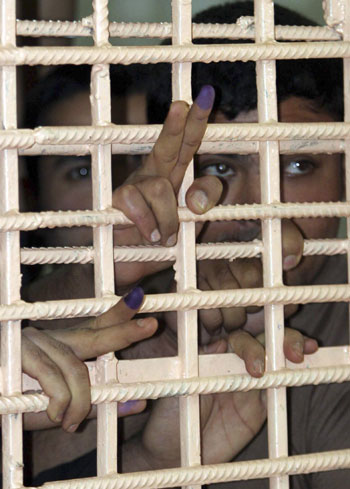Bomb attacks kill 12 as early voting begins in Iraq
A spate of attacks near polling stations in Baghdad killed at least 12 people and injured dozens despite tightened security as Iraq began an early voting on Thursday across the country for Sunday's parliamentary election.
 |
|
Inmates show their ink-stained fingers after voting inside a prison in Arbil, 310 km (190 miles) north of Baghdad March 4, 2010. Iraqi troops, police, prisoners and the infirm began voting on Thursday, three days ahead of a parliamentary election seen as pivotal for a divided country which U.S. troops are scheduled to leave by the end of 2011. [Xinhua/Reuters Photo] |
More than 800,000 Iraqi soldiers, police, hospital staff and prisoners cast their votes in the voting which began early morning on Thursday, as they will not be able to go to the polls on the election day due to work.
Up to 458 polling centers were opened in Iraq's 18 provinces to receive the eligible people, most of whom were from the country's security forces, said Qassim al-Abboudi, a senior official with the Iraqi Independent High Electoral Commission.
Qassim Atta, spokesman of the Baghdad Operation Command, said that the Iraqi security forces have beefed up security for polling centers across Baghdad.
However, the voting was still overshadowed with three deadly bombings.
The first attack was a roadside bomb which detonated near a polling center in Baghdad's northern neighborhood of al-Hurriyah, killing five civilians and wounding 22 others. The polling center is ready to be used for Sunday's general elections.
In the afternoon, a suicide bomber struck a bus carrying Iraqi soldiers outside a polling center in Baghdad's western district of Mansour, killing three soldiers and wounding 15 others.
The attacker blew up his explosive belt as the soldiers were leaving the bus to a polling center, according to a police source.
Less than an hour later, another suicide bomber blew up his explosive vest at Iraqi soldiers who were lining up at a school polling center in Bab al-Mu'dham area in downtown Baghdad. At least four soldiers were killed and 10 others injured.
On Wednesday, two suicide car bombers struck two government buildings in Baquba, capital of Diyala Province, and later a third suicide bomber blew himself at the Baquba hospital, targeting the wounded people who were transported to the hospital for treatment. The three blasts killed at least 30 people.
Last month, Abu Omer al-Baghdadi, leader of the self-styled Islamic State of Iraq, threatened to attack the country's parliamentary elections to prevent the voting process "by all possible means, primarily, the military means."
However, many Iraqis, including the injured people who were hit by triple suicide bombings in Diyala, still voted.
"I have lost my hand yesterday but I still have my right to vote to defy those who are killing innocent people. This is my hope," said Salim Mohammed, a medic who was wounded by a suicide bombing at the Baquba hospital.
According to electoral organizers, some 19 million Iraqis, including 1.4 million living abroad in 16 countries, are eligible to vote for the 325-seat Iraq's Council of Representatives with some 6,300 candidates.
The election is regarded crucial for the country's national reconciliation and political process as Iraq has been struggling to improve security situation in the past few years and preparing itself for a planned full withdrawal of U.S. troops at the end of 2011.
 0
0 







Go to Forum >>0 Comments